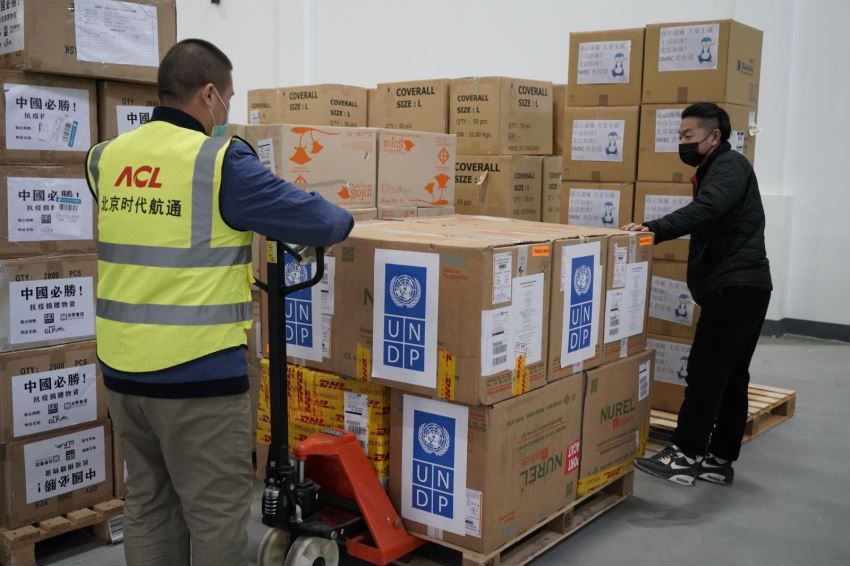Since its outbreak, the effects of the coronavirus have been felt in countries across the world. With around 110,000 confirmed cases of COVID19 and over 4,000 deaths (March 10), this epidemic has put public health systems and emergency services under immense pressure. Demand for medical supplies and protective equipment has surged, and many people have been quarantined due to suspected contamination. However, while the circumstances have been severe, this crisis has also been a strong reminder of China’s resilience and the importance of international solidarity.
To date, the efforts China has made to address this epidemic have been impressive. At the epicenter of the outbreak in Hubeiprovince, health and emergency service personnel have been working tirelessly around the clock and deserve our gratitude and admiration. Inspection and screening measures as well as movement restrictions have been effective in halting the virus’ spread.
In addition, the government’s willingness to receive international advice and expertise, in particular from the World Health Organization (WHO), has been instrumental in advancing knowledge of this new virus and will help all nations protect their people and control the outbreak. As the first country to face this crisis, China has many experiences that the international community can learn and apply in their respective situations.
Indeed, to fully control and defeat this epidemic, international cooperation is indispensable. With confirmed cases now in more than 100 countries around the world, collective action and solidarity are more important than ever.
This is not a time to point fingers and assign blame, particularly based on incomplete or unverified information. Reports of discrimination and prejudice as a result of this crisis are worrying. Fake or inaccurate news, labeled the “infodemic” by the WHO, can only sow fear and divide people at time when working together is absolutely essential.
In the spirit of solidarity, UNDP is committed to working with countries and communities across the world in the fight against this epidemic. In China,UNDP has fully supported the people and government, working with relevant authorities to provide emergency support and assist in the procurement of critical medical supplies. With initial funding of half a million USD for immediate response measures, UNDP has provided urgently needed equipment including infusion pumps, patient monitoring systems and protective suits, which are vital to reduce the infection risk facing frontline health personnel.

The second batch of protective suits UNDP donotes to China arrives in Beijing. (Photo courtesy of UNDP)
UNDP has also launched a social media campaign titled Spread the Word, Not the Virus, to combat the aforementioned “infodemic” so that everyone has the knowledge they need to properly protect themselves. With over 27 million views, the campaign has mobilized netizens to share reliable information from the WHO in over 40 languages and dialects so that the elderly or those in ethnic minority communities who might not speak Mandarin can have access to it.
Moving forward, we must recognize the fact that this crisis transcends health. Already we are seeing signs of a potential constraining impact on regional as well as global economic growth. Unlike during the 2002-03 SARS outbreak when China contributed merely 4 percent to global GDP, it now accounts for roughly 16 percent. As the world’s second largest economy and a massive consumer market, China is intractably linked with the rest of the globe through trade, investment and finance. Its integration into global value chains and transportation networks is multifaceted and complex. For example, 7 out of the 10 biggest ports are located in China.
At home, the economic fallout is expected to impact people’s livelihoods, with the disadvantaged suffering the most. Due to quarantine measures, many people in China have not been able to return to work as yet. In the absence of savings and financial coping mechanisms, those who have been recently lifted out of poverty could face the risk of sliding back.
Therefore, beyond the immediate emergency response, it is crucial to address the socio-economic impact of the crisis and focus on protecting vulnerable communities in the most affected areas. Efforts must be made to understand the effects of the virus at the household level as well as on Small and Medium Enterprises (SMEs) that constitute the backbone of many local economies, to gauge the extent to which the epidemic is impacting the ability of families and individuals to support themselves.
To this end, UNDP is currently working to implement socio-economic assessments of the health crisis in Hubei province through household surveys examining vulnerable and impoverished groups. Complementary to this, data will also be collected to measure the impact of the virus induced lull in economic activity on SMEs and POEs. These findings will inform measures taken by local governments to help increase community resilience.
As always, UNDP’s commitment remains the achievement of the Sustainable Development Goals for everyone, everywhere. We will continue to assist China in overcoming the setbacks brought on by this epidemic, and help to achieve its goal of ending extreme rural poverty in 2020.
The progress made so far in combating the coronavirus has been encouraging. However, this is not a battle that ends when the last confirmed case is treated. The ramifications of this epidemic will be wide-ranging and enduring and we must work to fully understand them in the near-term in order to address potential challenges in the long-term. In this way, we can ensurethat recovery from this crisis is sustainable and thatin its aftermath, no one is left behind.
Beate Trankmann is the UNDP Resident Representative in China.
Opinion articles reflect the views of their authors, not necessarily those of China.org.cn and Chinagate.cn